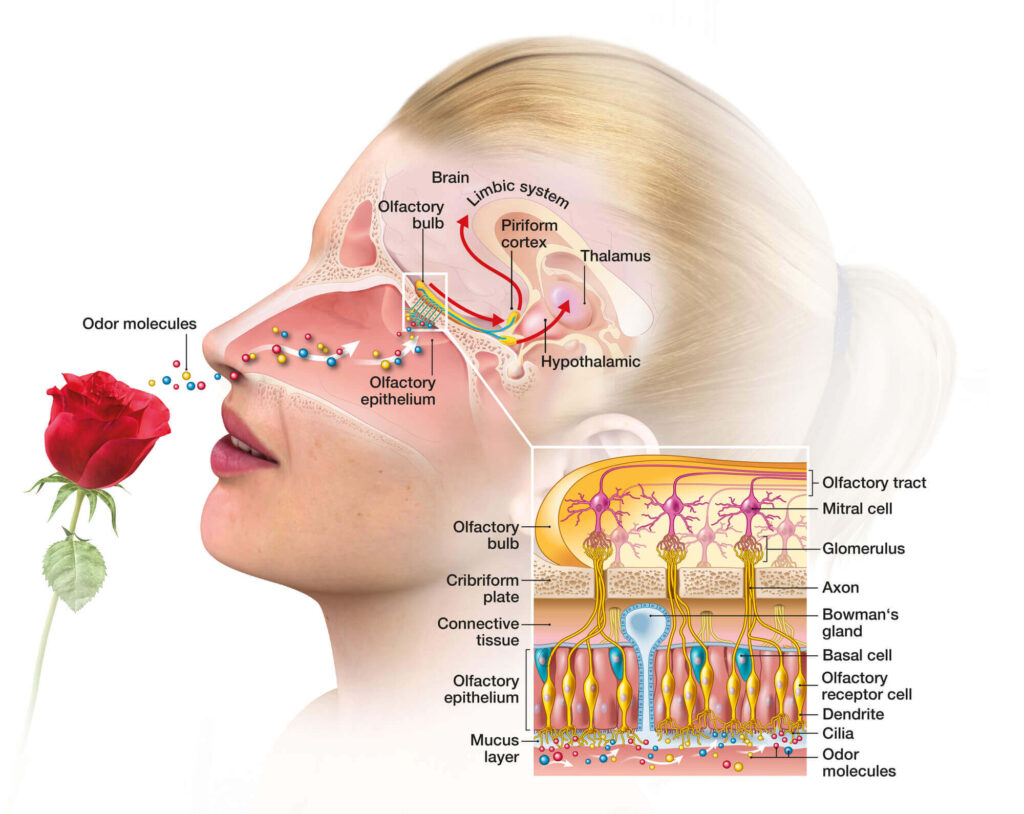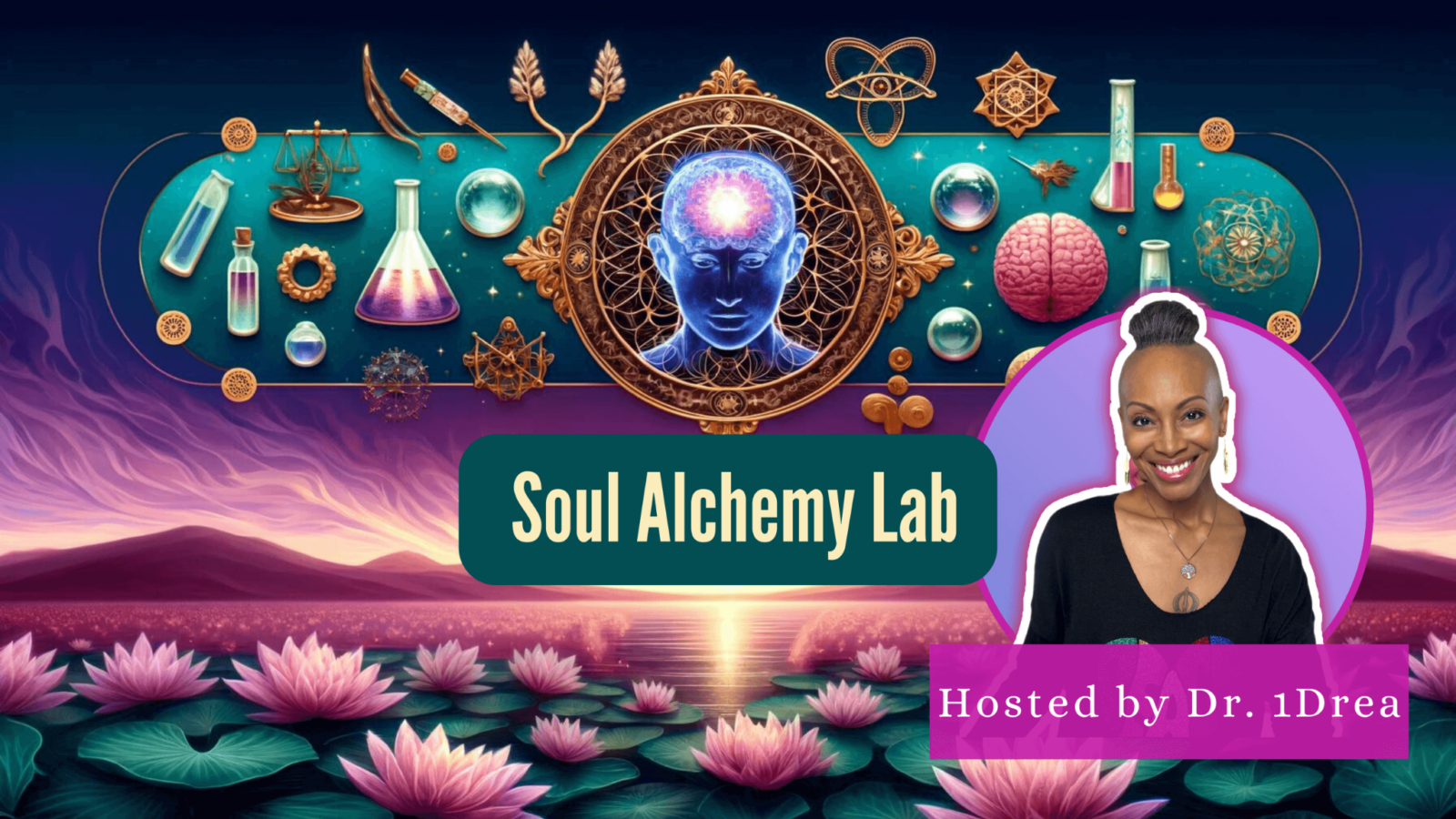Imagine being able to shift your mood as easily as lighting a scented candle. Science says, with your sense of smell, you actually can. Here’s how. Today, we’ll uncover the fascinating connection between our sense of smell, emotions, and memories, and explore how understanding this connection can enhance our well-being.
As my husband and I launch our new suite of Soul Sense Alchemy products, crafted in the perfume capital of the world, the French Riviera, we invite you to discover how to use scents to improve mood and spirituality. Our first limited edition sets, complete with guided meditations and rituals for wellbeing, are now available for pre-order.
Our Olfactory System
Our journey into the world of scents begins with the human olfactory system. It’s a direct line of communication from our noses to our brains, as it bypasses the intermediary steps required by our other senses. When odor molecules bind to receptors in our nose, these signals are directly transmitted to the olfactory bulb in your brain.
This bulb is located within the limbic system, a crucial part of the brain involved in processing emotions and memories. The olfactory system’s direct pathway explains why scents can immediately evoke immediate and powerful emotional reactions in us.
The Emotional Connection
Understanding how to use scents to improve mood can be a powerful tool for enhancing emotional well-being. Have you ever noticed that certain scents evoke strong emotions or bring back vivid memories? This is possible because of the olfactory system’s ability to bypass the thalamus, the brain’s relay station for sensory information.
This detour means that olfactory inputs quickly reach areas of the brain involved in memory and emotion, making the sense of smell exceptionally potent in influencing how we feel and remember. This is why a whiff of a familiar perfume can suddenly make you feel nostalgic, or the smell of the ocean can bring back memories of a childhood vacation.
How to Harness the Power of Scent
So, how can we use this knowledge to our advantage? Engaging with specific scents can consciously influence our mood. Whether it’s the calming scent of lavender to relax, the refreshing aroma of citrus to energize, or a fragrance that reminds you of a happy time, you can leverage scent therapy to cultivate your desired emotional state.
Incorporating perfumes, essential oils, or scented candles into your daily routine can be a simple yet effective way to enhance your mood and overall sense of well-being.
But before we reveal the best ways to use scent to improve your mood, let’s explore the science of how scent affects your brain chemistry.
Scent and Brain Chemistry
A scent is a powerful tool for influencing mood and brain chemistry, and this is a fascinating area of study within the fields of olfactory science and neuropsychology. Here are several scientific facts highlighting how mood-enchanting scents impact us:
- Direct Pathway to the Brain: The olfactory system has a direct pathway to the brain’s limbic system, which includes areas like the amygdala and the hippocampus, regions heavily involved in emotion and memory processing. This direct connection explains why scents can evoke strong emotional responses and vivid memories almost instantaneously.
- Mood Regulation: Research has shown that certain scents can significantly affect mood. For example, lavender is widely recognized for its relaxing and calming fragrance’s effect, often used to reduce stress and anxiety levels. On the other hand, citrus scents, like lemon and orange, are known to uplift mood and increase alertness.
- Stress Reduction: A study published in the Journal of the Medical Association of Thailand found that inhaling the scent of lavender oil decreased blood pressure, heart rate, and skin temperature, indicating a decrease in the autonomic arousal to stress.
- Improved Sleep Quality: The scent of lavender has also been linked to improved sleep quality. Research published in the Journal of Alternative and Complementary Medicine found that lavender aroma improved the sleep quality of participants, likely due to its effects on slowing down the nervous system.
- Enhanced Cognitive Performance: Certain scents have been found to enhance cognitive performance. Peppermint, for example, has been shown to improve memory and increase alertness. A study in the International Journal of Neuroscience demonstrated that peppermint scent improved memory and processing speeds in participants.
- Influence on Social Behavior: Scents can also influence social behaviors and perceptions. For instance, studies have found that the smell of clean environments, created by citrus-scented cleaning products, can make people more charitable and ethical in their behaviors.
- Pain Perception: Interestingly, scents can even alter our perception of pain. A study from the Journal of Pain showed that the smell of almond extract significantly reduced the intensity of pain experienced by participants during a cold pressor test, suggesting that pleasant aromas may have analgesic effects.
- Appetite and Digestion: Smells can trigger appetite and influence digestion by inducing salivation and the release of digestive enzymes. The smell of food can prepare the body for digestion by activating the salivary glands and the gastrointestinal tract, enhancing the overall eating experience.
These findings illustrate the profound impact scents can have on our psychological and physiological states, showcasing their potential for therapeutic applications, from stress relief and improved sleep to enhanced cognitive function and mood regulation. Understanding how to use scents to improve mood is key to leveraging their benefits effectively. The field continues to explore the mechanisms behind these effects, offering insights into the intricate relationship between our sense of smell and overall well-being.
Scents Cultivate Positive Emotions
One of the ways we encourage you to utilize scent in your everyday personal development routine is by linking scent to positive emotional states.
Beyond just enjoying pleasant aroma for mood improvement, actively savoring scents can help us cultivate positive emotions. When we take a moment to breathe in a scent and truly appreciate it, we not only enjoy the present moment more fully but also develop stronger emotional resilience. By forming positive associations with certain scents, we can create a repertoire of emotional tools that support our mental health.
Our sense of smell offers a unique power to directly affect our emotions and memories, shaping our experiences and well-being in profound ways. By understanding and utilizing this connection, we can enhance our emotional landscape, creating more moments of joy, peace, and fulfillment in our lives. Before we part, I encourage you to get out your favorite candle or essential oil, and join me in a Guided Meditation transition ritual designed to help you switch off the brain, decrease work stress, and shift into relaxation mode at the end of a work day.
Check out our Transition Ritual guided visualization on Insight Timer here.
Explore the world of scents, discover what resonates with you, and see how mood lifting scents transform your well-being and memories. Share your experiences and favorite scents in the comments below, and let’s continue this aromatic journey together.
Don’t forget to explore our Soul Sense Alchemy line for products specifically created to enrich this journey.
Join the Soul Sense Alchemy early notification list for advanced notice on our product releases, discount coupons, access to music and affirmation playlists, and inspiring guided meditations with 30-day journal prompts for spiritual growth, healing, stress relief and more!
Get inspired by our in-depth video essays on neuroaesthetics, neuropsychology, the Law of Attraction, and alchemy on our YouTube channel here.















